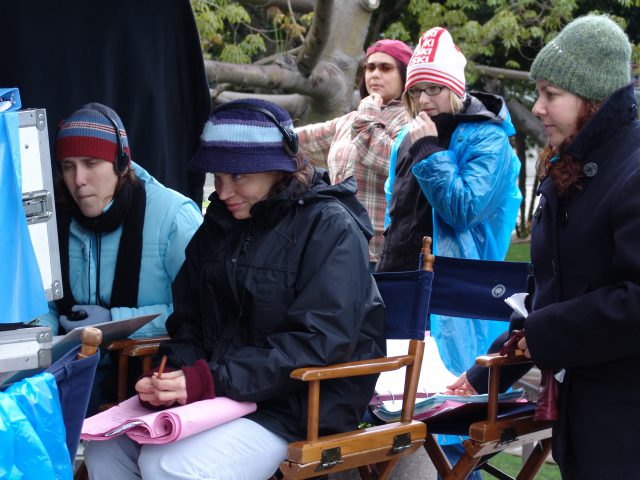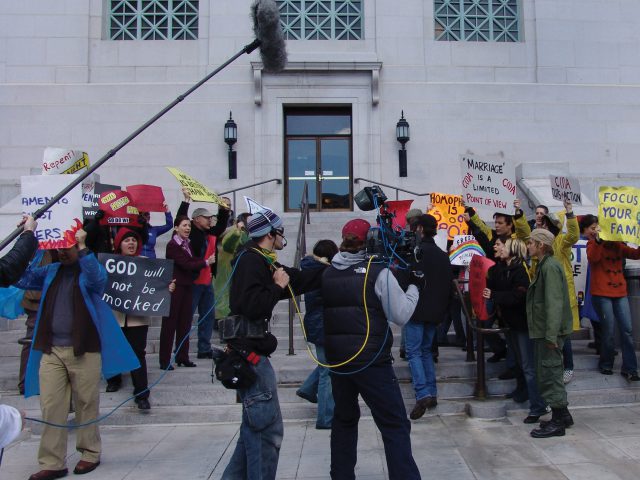In A-cup girl in a C-cup world, Anna (Melonie Diaz) feels lost, miserable and hopeless. Recently dumped by her girlfriend, turned down from her only choice college, and working as a receptionist for a plastic surgery clinic, Anna’s future seems bleak. That is, until she meets Sadie (Nicole Vicius), leader of a radical feminist underground group called Clits In Action. Upon leaving the office one evening, Anna sees Sadie spray-painting the windows of her office building. The words read, “A Woman Is More Than Her Parts,” signature C(I)A. That night she invites Anna to join her and her friends in a political movement.
The Itty Bitty Titty Committee is the story of a girl’s evolving political consciousness and transcendence into political extremism. “I feel like there’s an Anna in every woman. There is a woman who’s insecure. There is a woman who has potential to grow. There is a woman that wants to be part of a group, like the C(I)A,” says Diaz.
At the C(I)A’s quarters, Anna meets Shulamith Firestone (Carly Pope), the quick-witted, hardcore feminist, who informs her that the death rate from liposuction victims is higher than the death rate from automobile accidents. Shulie explains to Anna that the public arena is entirely dominated by phallo-centric imagery, chauvinistic political leaders and male fantasies of women. “Most women aren’t even aware of how much it affects them. We’re not trained to think the right way. We’re not trained to see what’s all around us,” Shulie says in the film.
“You don’t see so many of these films,” says Vicius about the issues the film tackles. “I think it teaches young girls to have a little faith. It’s not just about how you look, what you wear and who you know; and that’s being perpetuated everywhere.”
Co-star Daniela Sea agrees: “I think what’s happening now is this revival of understanding and this bridging the gap between all generations, which is going to empower so many people. That’s what happened on this film.”
And the world is taking notice. IBTC made its world premiere at The Berlinale Film Festival this February, receiving a Teddy Award nomination (Berlin’s official queer award). Then in March, the film picked up the Jury Prize for Best Feature at the SXSW Film Festival in Austin, Texas, and the Audience Choice Award for Best Feature at the Melbourne Queer Film Festival.
Sea plays C(I)A member Calvin, a military bomb specialist who received an honorable discharge for violating the “don’t ask, don’t tell” policy. IBTC also stars Melanie Mayron as Courtney, Sadie’s mature girlfriend who runs a non-profit organization called Women For Change. Deak Evgenikos plays Meat, the C(I)A’s artistic genius; Lauren Mollica is Aggie, the C(I)A’s female to male transgender participant; and Guinevere Turner provides star power as Marcy Maloney, a TV hostess.
After four consecutive years producing award-winning shorts, Itty Bitty Titty Committee is the first feature film produced by Professional Organization of Women in Entertainment Reaching Up (POWER UP). It has a predominantly female cast and crew, under the direction of Jamie Babbit. The idea for the film came to Babbit and her partner, producer Andrea Sperling, while Babbit was directing 1999’s But I’m A Cheerleader.
Since Stacy Codikow and Amy Shomer founded the organization in 2000, POWER UP’s mission has been to promote the visibility and integration of gay women in entertainment, the arts, and all forms of media. “I wanted to start a group that was going to empower women, give them opportunities to make movies and tell the stories they couldn’t have,” says executive director Codikow. The members are women and men, gay and straight, who share a singular purpose: to promote diversity by supporting this mission. Since its launch, POWER UP has awarded filmmaking grants totaling over $1.5 million, a mixture of sponsorships, and in-kind services from studios and production houses.
Babbit and Sperling were involved from the beginning, serving on POWER UP’s honorary board of directors. The team directed and produced (respectively) POWER UP’s very first short film Stuck.
Having both undergone a feminist awakening and having been inspired by the music coming out of Olympia, Washington, in the early ‘90s, they wanted to make a movie about that experience and use the music to emphasize their vision. “It was like the music came first and the movie came second,” says Babbit.
When POWER UP came to them and said they were starting to finance feature-length films, Sperling pitched the idea right away. “We wanted it to be all women working on the film. We wanted to create this fake feminist utopia when we were making the movie in the same way that a lot of the music and the ideas relate to what Anna’s learning.”
“We all came together and were working for the same reason, because everyone believed in the project. It wasn’t about money and it wasn’t about everyone’s own interest. It shows women they can be individuals and also work collectively to change some of these stereotypes that have been perpetuated in this system,” says Vicius.
Adds Mayron: “I’ve acted and worked a lot in this business, about twenty-nine years. I haven’t had this kind of experience again until now, which shows how rare it is.”
“There is very little effort going on to equalize women’s rights legally in this country and I think a lot of us have forgotten that,” says Lisa Thrasher, producer of IBTC and head of POWER UP’s grant program. “That old conservativism under the constitution and under the U.S. Supreme Court does not recognize gender discrimination or sexual discrimination as a strict scrutiny.”
The character of Shulamith Firestone is based off the real Jewish Canadian-born feminist. She is a central figure in the early development of radical feminism, which was largely motivated by or concerned with the liberation of women from subordination to men.
“I think the themes of the movie are very relevant to what POWER UP is trying to do,” says Babbit. “It’s a lesbian project about a woman becoming a ‘womyn’ with a ‘Y.’ This movie is about a kind of feminist transformation, a global awareness.”
While attending Columbia University in the early ‘90s, Babbit was influenced by the political actions of The Guerilla Girls and PETA (People for the Ethical Treatment of Animals).i She found The Guerilla Girls to be both comedic and effective with their gorilla masks and spray-paint assault on male-dominated museums. Clits In Action is partly inspired by these antics, and Babbit got permission to use The Guerrilla Girls’ slogans and artwork in the film.
“I hope young people see it and appreciate it,” says Babbit. “I hope they will think twice and not view feminism as a dirty word. And people like me who come from that background will relate to it.”
Adds Sea, “I hope kids come away from this movie showing they can be part of something, that it’s something with a continuum, that they have a culture. I think it’s important what you put out in the world. Its part of what creates the world we live in.”
After successful screenings at the Berlinale, SXSW, the London Lesbian & Gay Film Festival (opening night) and Melbourne (closing night), the film’s next stop is the Miami Gay and Lesbian Film Festival (mglff.com) later this month. To learn more about POWER UP and get updates on Itty Bitty Titty Committee and its theatrical release, visit power-up.net and myspace.com/ittybittymovie.




What Do You Think?